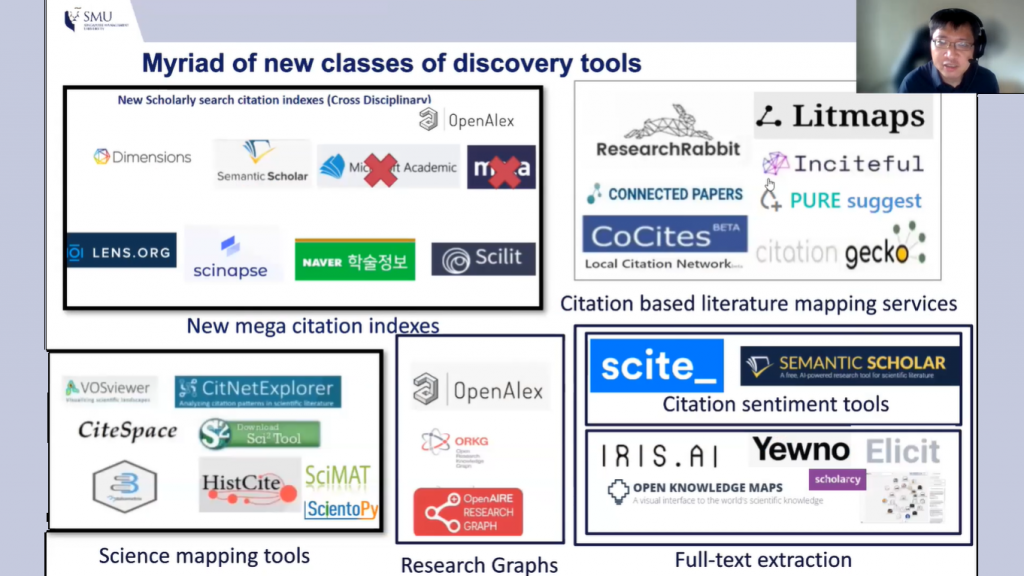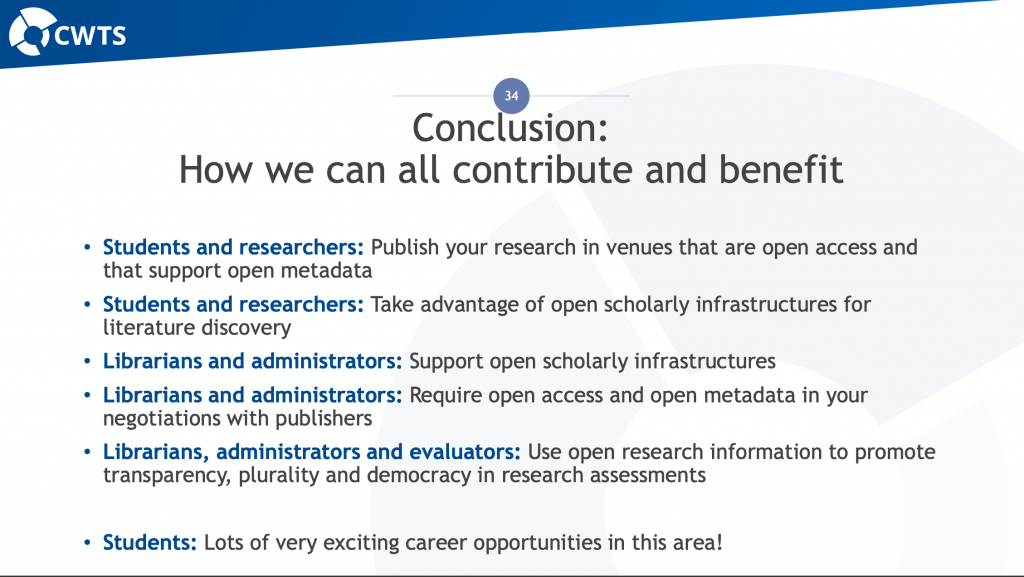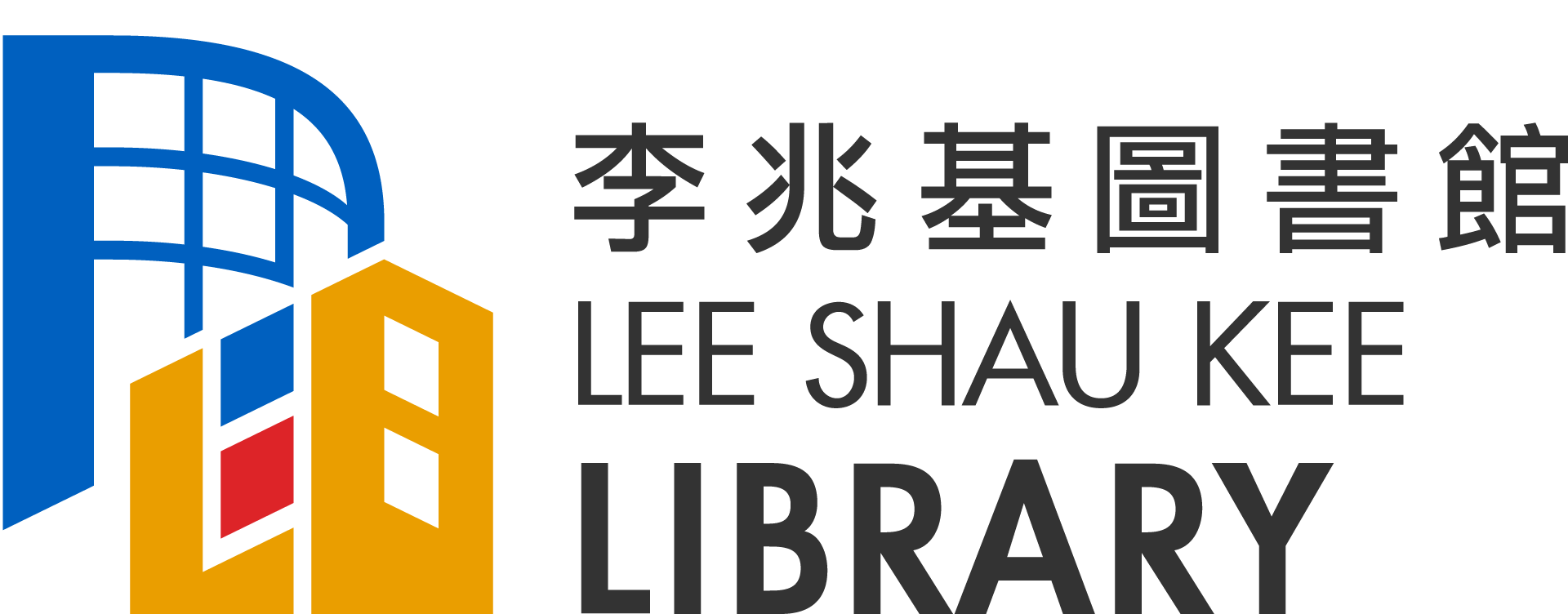
This week, HKUST librarians Kevin, Aster, and Samson highlight key takeaways from the three inspiring seminars in our Open Metadata & Research Process series this semester.
Improving the researcher workflow with innovative applications: What does open Scholarly metadata and open access have to do with this
Given that screening thousands of literatures on a research topic is too labour intensive, researchers are always looking for better ways to do systematic review. With the advancements in machine learning and availability of open metadata and full-text access to scholarly works, new tools have emerged and aided researchers to deal with the enormous increase of available literatures.
In the first talk (video, sign-in required), Mr. Aaron Tay, Data Services Lead from Singapore Management University Libraries introduced some pioneering research applications. Aaron started with the basics of large language models (e.g. GPT3, LaMDA) and their applications. He highlighted a couple of research discovery tools including elicit.org and scite.ai that use machine learning model, open scholarly metadata and open full-text. These tools are helpful in recommending papers falling through the cracks of a traditional keyword search, and accelerating the step of screening abstracts and references for systematic review.

Aaron introducing emerging discovery tools and applications for scientific research While there are many emerging tools in the market, Aaron reminded researchers three key areas when evaluating new tools:
- Underlying data
- Technical models and methods
- Business model
A good technical documentation or an “About us” page can sufficiently address these issues in relation to content coverage, robust infrastructure, and long-term sustainability. Aaron also recommended young researchers to support open metadata by contributing abstract and references of their scholarly work to the Crowdsourced Open Citations Index (CROCI).
Open metadata of scientific publications: Ongoing developments, new opportunities and next steps
In the second talk (video | slides), Prof. Ludo Waltman of Leiden University walked us through the journey towards achieving full openness of research information such as publication metadata.
What is publication metadata? Why open?
Publication metadata includes not only article title, author names, journal information, but also citation data (or reference lists), which are “extremely important information about the way scientific knowledge is accumulating”. Couple of years ago, citation data were still locked by publishers and the commercial databases such as Web of Science and Scopus. Thanks to the Initiative for Open Citations (I4OC), the reference lists of more than 60 million journal articles have been fully opened through CrossRef now. This is a big milestone in the open science movement, and the next step is to push scholarly publishers to open the abstracts and affiliations of their publications as well.
So why these matter to me, as a researcher?
Think about literature searching. By having the abstracts and citation links, it means everyone can build their own platforms for literature discovery. This will lower our reliance on the commercial subscription-based databases that help us decide what to read based on their algorithms. Also, think about university ranking. By opening the affiliation information, data for university ranking can be more transparent, which may help scholars make better decisions on where to go to pursue their careers. In fact, all these data are researchers’ own data and “we are entitled to get these data from the publishers”.
The full openness of metadata also means more people, including administrators and policy makers, are able to access research information and create more responsible metrics for research assessment across different disciplines. This is a crucial step for us to move away from an “impact factor” dominated evaluation system, to a more pluralistic perspective of evaluating research.

Ludo concluded his talk with recommendations on how students, researchers, librarians, and university administrators can contribute to and benefit from open access and open metadata.
Where will we be in five years’ time? The shifting landscape of open science and research evaluation
In the final talk (video | slides), Professor Cameron Neylon, Professor of Research Communication at the Centre for Culture and Technology at Curtin University, provided valuable career advice for early career researchers (ECRs).
From Past to Present: Towards diverse research assessment
When Cameron was an ECR in chemistry, his senior colleagues once told him a formula of success – “To be a full professor, you need to publish 50 research papers and secure 1 million research income.” The scope of research evaluation was rather limited to metrics such as the number of publications and citation counts.
As the scientific communication have been changed, the above advice may not reflect current situation. From San Francisco Declaration on Research Assessment and Leiden Manifesto for Research Metrics to the recent Agreement on Reforming Research Assessment by the European Union, the research evaluation changed from citation metrics focused to more diverse assessment with openness, transparency and reproducibility. Cameron emphasized that more and more institutions and funders nowadays make their decisions based on diverse evidence of research impact instead of the counts of articles in the “right” journals.
The Future: Find your own sweet spots
Such radical changes provide both challenges and opportunities. Cameron advised ECRs to find the sweet spots, the useful indicators to recognize what you value about your work and where those indicators can be credible. You can collect them and build diverse evidence for your research impact. Cameron also encouraged ECRs to seek advice from not only senior researchers but also younger researchers. He remembered that everybody laughed at him 15 years ago when he suggested that the “mentions in Twitter” can be one of the useful ways to understand the reach of the research output. It is a good example of the change of research assessment.
Cameron rounded up his talk with his career advice. As a researcher who changed the career path from science to research communication, he mentioned that writing skills is a transferable skill and he encouraged ECRs to be open-minded for opportunities to develop their own career path. He also mentioned that even though competition is tough nowadays, maintaining a healthy work-life balance would lead to better long-term career development.
Please visit this page for more details about the seminar description, speaker bio, and seminar recordings & slides.







